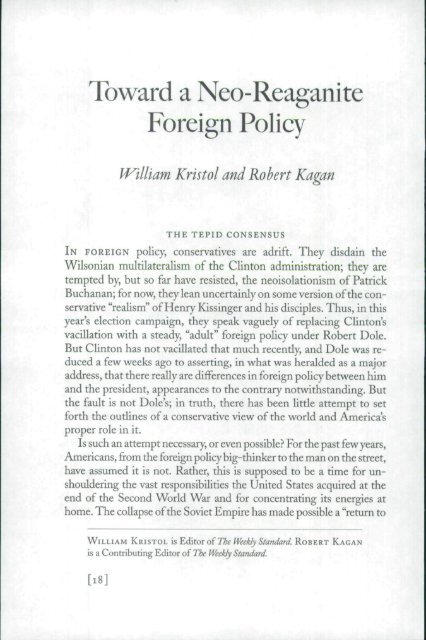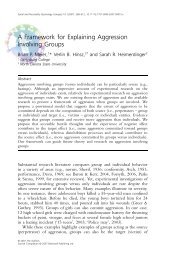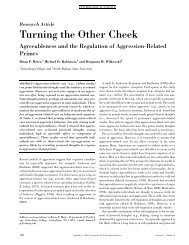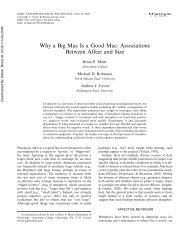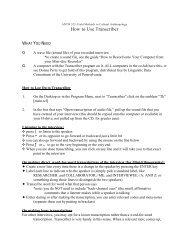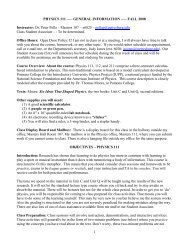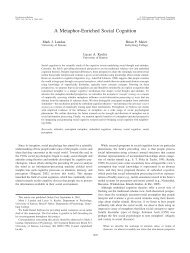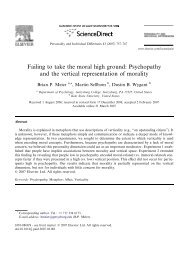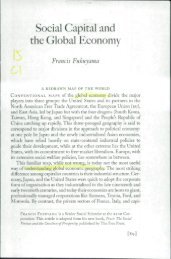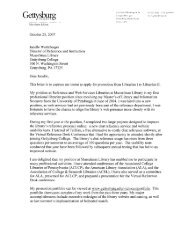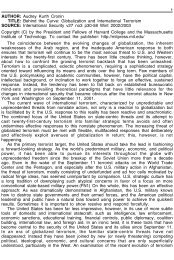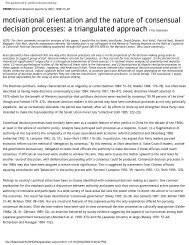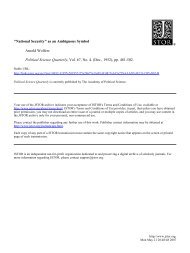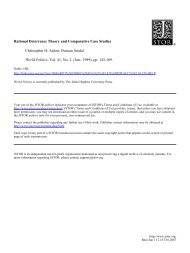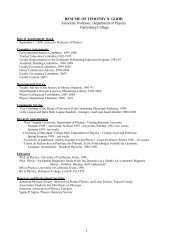Toward a Neo-Reaganite Foreign Policy - Gettysburg College
Toward a Neo-Reaganite Foreign Policy - Gettysburg College
Toward a Neo-Reaganite Foreign Policy - Gettysburg College
You also want an ePaper? Increase the reach of your titles
YUMPU automatically turns print PDFs into web optimized ePapers that Google loves.
<strong>Toward</strong> a <strong>Neo</strong>-<strong>Reaganite</strong><br />
<strong>Foreign</strong> <strong>Policy</strong><br />
William Kristol and Robert Kagan<br />
THE TEPID CONSENSUS<br />
IN FOREIGN policy, conservatives are adrift. They disdain the<br />
Wilsonian multilateralism of the Clinton administration; they are<br />
tempted by, but so far have resisted, the neoisolationism of Patrick<br />
Buchanan; for now, they lean uncertainly on some version ofthe conservative<br />
"realism" of Henry Kissinger and his disciples. Thus, in this<br />
years election campaign, they speak vaguely of replacing Clintons<br />
vacillation with a steady, "adult" foreign policy under Robert Dole.<br />
But Clinton has not vacillated that much recently, and Dole was reduced<br />
a few weeks ago to asserting, in what was heralded as a major<br />
address, that there really are differences in foreign policy between him<br />
and the president, appearances to the contrary notwithstanding. But<br />
the fault is not Dole's; in truth, there has been little attempt to set<br />
forth the outlines of a conservative view of the world and America's<br />
proper role in it.<br />
Is such an attempt necessary, or even possible? For the past few years,<br />
Americans, from the foreign policy big-thinker to the man on the street,<br />
have assumed it is not. Rather, this is supposed to be a time for unshouldering<br />
the vast responsibilities the United States acquired at the<br />
end of the Second World War and for concentrating its energies at<br />
home. The collapse ofthe Soviet Empire has made possible a "return to<br />
WILLIAM KRISTOL is Editor of T-6f Weekly Standard. ROBERT KAGAN<br />
is a Contributing Editor of The Weekly Standard.<br />
[18]
<strong>Toward</strong> a <strong>Neo</strong>-Reagantte <strong>Foreign</strong> <strong>Policy</strong><br />
normalcy" in American foreign and defense policy, allowing the adoption<br />
of a more limited definition of the national interest, with a commensurate<br />
reduction in overseas involvement and defense spending.<br />
Republicans and conservatives at first tended to be wary of this<br />
new post-Cold War consensus. But they joined it rapidly after 1992,<br />
in the wake of the defeat of the quintessential "foreign policy president"<br />
by a candidate who promised to focus "like a laser" on the domestic<br />
economy. Now conservatives tailor their foreign and defense<br />
policies to fit the presumed new political reality: an American public<br />
that is indifferent, if not hostile, to foreign policy and commitments<br />
abroad, more interested in balancing the budget than in leading the<br />
world, and more intent on cashing in the "peace dividend" than on<br />
spending to deter and fight fijture wars. Most conservatives have chosen<br />
to acquiesce in rather than challenge this public mood.<br />
In a way, the current situation is reminiscent of the mid-1970s. But<br />
Ronald Reagan mounted a bold challenge to the tepid consensus of<br />
that era—a consensus that favored accommodation to and coexistence<br />
with the Soviet Union, accepted the inevitability of America's<br />
declining power, and considered any change in the status quo either<br />
too frightening or too expensive. Proposing a controversial vision of<br />
ideological and strategic victory over the forces of international communism,<br />
Reagan called for an end to complacency in the face of the<br />
Soviet threat, large increases in defense spending, resistance to communist<br />
advances in the Third World, and greater moral clarity and<br />
purpose in U.S. foreign policy. He championed American exceptionalism<br />
when it was deeply unfashionable. Perhaps most significant, he<br />
refiised to accept the limits on American power imposed by the domestic<br />
political realities that others assumed were fixed.<br />
Many smart people regarded Reagan with scorn or alarm. Liberal<br />
Democrats still reeling from the Vietnam War were, of course, appalled<br />
by his zealotry. So were many of Reagan's fellow Republicans,<br />
especially the Kissingerian realists then dominant in foreign affairs.<br />
Reagan declared war on his own party, took on Gerald Ford for the<br />
1976 Republican presidential nomination (primarily over issues of<br />
foreign policy), and trained his guns on Kissinger, whose stewardship<br />
of U.S. foreign policy, he charged, had "coincided precisely with the<br />
loss of U.S. military supremacy." Although Reagan lost the battle to<br />
FOREIGN AFFAIRS • July/August 1996 [19]
William Kristol and Robert Kagan<br />
unseat Ford, he won the fight at the Republican convention for a platform<br />
plank on "morality in foreign policy." Ultimately, he succeeded<br />
in transforming the Republican party, the conservative movement in<br />
America, and, after his election to the presidency in 1980, the country<br />
and the world.<br />
BENEVOLENT HEGEMONY<br />
YEARS later, it is time once again to challenge an indifferent<br />
America and a confiised American conservatism. Today's lukewarm<br />
consensus about America's reduced role in a post-Cold War world is<br />
wrong. Conservatives should not accede to it; it is bad for the country<br />
and, incidentally, bad for conservatism. Conservatives will not be able<br />
to govern America over the long term if they fail to offer a more elevated<br />
vision of America's international role.<br />
What should that role be? Benevolent global hegemony. Having<br />
defeated the "evil empire," the United States enjoys strategic and ideological<br />
predominance. The first objective of U.S. foreign policy<br />
should be to preserve and enhance that predominance by strengthening<br />
America's security, supporting its friends, advancing its interests,<br />
and standing up for its principles around the world.<br />
The aspiration to benevolent hegemony might strike some as either<br />
hubristic or morally suspect. But a hegemon is nothing more or less than<br />
a leader with preponderant infiuence and authority over all others in its<br />
domain. That is America's position in the world today. The leaders of<br />
Russia and China understand this. At their April summit meeting,<br />
Boris Yeltsin and Jiang Zemin joined in denouncing "hegemonism" in<br />
the post-Cold War world. They meant this as a complaint about the<br />
United States. It should be taken as a compliment and a guide to action.<br />
Consider the events of just the past six months, a period that few<br />
observers would consider remarkable for its drama on the world stage.<br />
In East Asia, the carrier task forces of the U.S. Seventh Fleet helped<br />
deter Chinese aggression against democratic Taiwan, and the 35,000<br />
American troops stationed in South Korea helped deter a possible invasion<br />
by the rulers in Pyongyang. In Europe, the United States sent<br />
20,000 ground troops to implement a peace agreement in the former<br />
Yugoslavia, maintained 100,000 in Western Europe as a symbolic<br />
[20] FOREIGN AVYAIRS Volume7S^0.4
<strong>Toward</strong> a <strong>Neo</strong>-<strong>Reaganite</strong> <strong>Foreign</strong> <strong>Policy</strong><br />
commitment to European stability and security, and intervened diplomatically<br />
to prevent the escalation of a conflict between Greece and<br />
Turkey. In the Middle East, the United States maintained the deployment<br />
of thousands of soldiers and a strong naval presence in the Persian<br />
Gulf region to deter possible aggression by Saddam Hussein's Iraq<br />
or the Islamic fundamentalist regime in Iran, and it mediated in the<br />
conflict between Israel and Syria in Lebanon. In the Western Hemisphere,<br />
the United States completed the withdrawal of 15,000 soldiers<br />
after restoring a semblance of democratic government in Haiti and, alniost<br />
without public notice, prevented a mil-<br />
itary coup in Paraguay. In Africa, a U.S. ex- AmCM-Jcans tail to lioticc<br />
peditionary force rescued Americans and<br />
others trapped in the Liberian civil conflict. ^^^'^^ ^'"^^V hiive never<br />
These were just the most visible Ameri- \y^i\ it SO SOod.<br />
can actions ofthe past six months, and just<br />
those of a military or diplomatic nature.<br />
During the same period, the United States made a thousand decisions<br />
in international economic forums, both as a government and as<br />
an amalgam of large corporations and individual entrepreneurs, that<br />
shaped the lives and fortunes of billions around the globe. America<br />
influenced both the external and internal behavior of other countries<br />
through the International Monetary Fund and the World Bank.<br />
Through the United Nations, it maintained sanctions on rogue states<br />
such as Lihya, Iran, and Iraq. Through aid programs, the United<br />
States tried to shore up friendly democratic regimes in developing<br />
nations. The enormous web ofthe global economic system, with the<br />
United States at the center, combined with the pervasive influence of<br />
American ideas and culture, allowed Americans to wield influence in<br />
many other ways of which they were were entirely unconscious. The<br />
simple truth of this era was stated last year by a Serb leader trying to<br />
explain Slobodan Milosevic's decision to flnally seek rapprochement<br />
with Washington. "As a pragmatist," the Serbian politician said,<br />
"Milosevic knows that all satellites ofthe United States are in a better<br />
position than those that are not satellites."<br />
And America's allies are in a better position than those who are not<br />
its allies. Most ofthe world's major powers welcome U.S. global involvement<br />
and prefer America's benevolent hegemony to the alter-<br />
FOREIGN ATVAIK% July/Augustigg6 [21]
William Kristol and Robert Kagan<br />
natives. Instead of having to compete for dominant global influence<br />
with many other powers, therefore, the United States finds both the<br />
Europeans and the Japanese—after the United States, the two most<br />
powerful forces in the world—supportive of its world leadership role.<br />
Those who anticipated the dissolution of these alliances once the<br />
common threat of the Soviet Union disappeared have been proved<br />
wrong. The principal concern of America's allies these days is not that<br />
it will be too dominant but that it will withdraw.<br />
Somehow most Americans have failed to notice that they have<br />
never had it so good. They have never lived in a world more conducive<br />
to their fundamental interests in a liberal international order,<br />
the spread of freedom and democratic governance, an international<br />
economic system of free-market capitalism and free trade, and the security<br />
of Americans not only to live within their own borders but to<br />
travel and do business safely and without encumbrance almost anywhere<br />
in the world. Americans have taken these remarkable beneflts<br />
ofthe post-Cold War era for granted, partly because it has all seemed<br />
so easy. Despite misguided warnings of imperial overstretch, the<br />
United States has so far exercised its hegemony without any noticeable<br />
strain, and it has done so despite the fact that Americans appear<br />
to be in a more insular mood than at any time since before the Second<br />
World War. The events ofthe last six months have excited no particular<br />
interest among Americans and, indeed, seem to have been regarded<br />
with the same routine indifference as breathing and eating.<br />
And that is the problem. The most difficult thing to preserve is<br />
that which does not appear to need preserving. The dominant<br />
strategic and ideological position the United States now enjoys is the<br />
product of foreign policies and defense strategies that are no longer<br />
being pursued. Americans have come to take the fruits of their hegemonic<br />
power for granted. During the Cold War, the strategies of deterrence<br />
and containment worked so well in checking the ambitions<br />
of America's adversaries that many American liberals denied that<br />
our adversaries had ambitions or even, for that matter, that America<br />
had adversaries. Today the lack of a visible threat to U.S. vital interests<br />
or to world peace has tempted Americans to absentmindedly<br />
dismantle the material and spiritual foundations on which their national<br />
well-being has been based. They do not notice that potential<br />
[22] FOREIGN AVVAl-R^-VolumeysNo.4
<strong>Toward</strong> a <strong>Neo</strong>-<strong>Reaganite</strong> <strong>Foreign</strong> <strong>Policy</strong><br />
challengers are deterred before even contemplating confrontation by<br />
their overwhelming power and influence.<br />
The ubiquitous post-Cold War question—^where is the threat?—<br />
is thus misconceived. In a world in which peace and American security<br />
depend on American power and the will to use it, the main threat<br />
the United States faces now and in the future is its own weakness.<br />
American hegemony is the only reliable defense against a breakdown<br />
of peace and international order. The appropriate goal of American<br />
foreign policy, therefore, is to preserve that hegemony as far into the<br />
future as possible. To achieve this goal, the United States needs a neo-<br />
<strong>Reaganite</strong> foreign policy of military supremacy and moral confidence.<br />
THREE IMPERATIVES<br />
SETTING FORTH the broad outlines of such a foreign policy is more<br />
important for the moment than deciding the best way to handle all the<br />
individual issues that have preoccupied U.S. policymakers and analysts.<br />
Whether or not the United States continues to grant most-favored-nation<br />
status to China is less important than whether it has an<br />
overall strategy for containing, influencing, and ultimately seeking to<br />
change the regime in Beijing. Whether NATO expands this year or flve<br />
years from now is less important than whether NATO remains strong,<br />
active, cohesive, and under decisive American leadership. Whether<br />
America builds 20 B-2 bombers or 30 is less important than giving its<br />
military planners enough money to make intelligent choices that are<br />
driven more by strategic than by budget requirements. But it is clear<br />
that a neo-<strong>Reaganite</strong> foreign policy would have several implications.<br />
The defense budget. Republicans declared victory last year when<br />
they added $7 billion to President Clinton's defense budget. But the<br />
hard truth is that Washington—now spending about $260 billion per<br />
year on defense—probably needs to spend about $6o-$8o billion<br />
more each year in order to preserve America's role as global hegemon.<br />
The United States currently devotes about three percent of its<br />
GNP to defense. U.S. defense planners, who must make guesses about<br />
a future that is impossible to predict with confldence, are increasingly<br />
being forced to place all their chips on one guess or another. They are<br />
being asked to predict whether the future is likely to bring more<br />
FOREIGN AYYA\K?>July/Augmti9g6 [23]
William Kristol and Robert Kagan<br />
conflicts like the Gulf War or peacekeeping operations like those in<br />
Bosnia and Haiti, or more great-power confrontations similar to the<br />
Cold War. The best answer to these questions is: who can tell? The<br />
odds are that in the coming decades America may face all these kinds<br />
of conflict, as well as some that have yet to be imagined.<br />
For the past few years, American military supremacy has been living<br />
off a legacy, speciflcally, the legacy of Ronald Reagan. As former<br />
Chairman of the Joint Chiefs of Staff Gen-<br />
No serious analyst ^^^ Colin Powell once noted, it was Reagan's<br />
A \^ u A c u military, built in the 1980s to deter the Soviet<br />
doubts that defense has Union, that won the war against Iraq. No seeut<br />
too much. rious analyst of American military capabilities<br />
today doubts that the defense budget has<br />
been cut much too far to meet America's responsibilities<br />
to itself and to world peace. The United States may no<br />
longer have the wherewithal to defend against threats to America's<br />
vital interests in Europe, Asia, and the Middle East, much less to extend<br />
America's current global preeminence well into the future.<br />
The current readiness of U.S. forces is in decline, but so is their ability<br />
to maintain an advantage in high-technology weapons over the coming<br />
decades. In the search for some way to meet extensive strategic requirements<br />
with inadequate resources, defense planners have engaged<br />
in strategic fratricide. Those who favor current readiness have been pitted<br />
against those who favor high-tech research and development; those<br />
who favor maintaining American forward deployment at bases around<br />
the world have been arrayed against those who insist that for the sake of<br />
economizing the job be accomplished at long range without bases. The<br />
military is forced to choose between army combat divisions and the next<br />
generation of bombers, between lift capacities and force projection, between<br />
short-range and long-range deterrence. Constructing a military<br />
force appropriate to a nation's commitments and its resources is never<br />
an easy task, and there are always limits that compel difficult choices.<br />
But today's limits are far too severe; the choices they compel are too dramatic;<br />
and because military strategy and planning are far from exact sciences,<br />
the United States is dangerously cutting its margin for error.<br />
The defense budget crisis is now at hand. Chairman of the Joint<br />
Chiefs General John Shalikashvili has complained that the weapons<br />
[24] FOREIGN AW AIRS Volume j5 No. 4
<strong>Toward</strong> a <strong>Neo</strong>-<strong>Reaganite</strong> <strong>Foreign</strong> <strong>Policy</strong><br />
procurement budget has been reduced to perilously low levels, and he<br />
has understated the problem. Since 1985, the research and development<br />
budget has been cut by 57 percent; the procurement budget<br />
has been cut j\ percent. Both the Clinton administration and the<br />
Republican Congress have achieved budget savings over the next few<br />
years by pushing necessary procurement decisions into the next century.<br />
The Chnton administrations so-called "Bottom-Up Review" of<br />
U.S. defense strategy has been rightly dismissed by Democrats like<br />
Senate Armed Services Committee member Joseph Lieberman (D-<br />
Conn.) as "already inadequate to the present and certainly to the future."<br />
Both the General Accounting Office and the Congressional<br />
Budget Office have projected a shortfall of S50 biUion to $100 biUion<br />
over the next five years in funding just for<br />
existing force levels and procurement plans, ^j^^ defense bud<br />
These shortfalls do not even take into ac- ...<br />
count the development of new weapons, like ^'"l^^S IS now at<br />
a missile defense system capable of protecting<br />
American territory against missiles<br />
launched from rogue states such as North Korea or shielding, say, Los<br />
Angeles from nuclear intimidation by the Chinese during the next crisis<br />
in the Taiwan Strait. Deployment of such a system could cost more<br />
than $10 billion a year.<br />
Add together the needed increases in the procurement budget<br />
called for by the Joint Chiefs of Staff and the justifiable increases in<br />
funding for existing forces to make up the shortfalls identified by the<br />
GAO and the CBO, and it becomes obvious that an increase in defense<br />
spending by $60 billion to $80 billion is not a radical proposal. It is<br />
simply what the United States will require to keep the peace and defend<br />
its interests over the coming decades.<br />
If this number sounds like a budget-buster, it should not. Today,<br />
defense spending is less than 20 percent of the total federal budget.<br />
In 1962, before the Vietnam War, defense spending ran at almost 50<br />
percent of the overall budget. In 1978, before the Carter-Reagan defense<br />
buildup, it was about 23 percent. Increases of the size required<br />
to pursue a neo-<strong>Reaganite</strong> foreign policy today would require returning<br />
to about that level of defense spending—still less than one-quarter<br />
of the federal budget.<br />
FOREIGN A¥VA\K^ - July/August 1996 [25]
William Kristol and Robert Kagan<br />
These days, some critics complain about the fact that the United<br />
States spends more on defense than the next six major powers combined.<br />
But the enormous disparity between U.S. military strength<br />
and that of any potential challenger is a good thing for America and<br />
the world. After all, America's world role is entirely different from<br />
that of the other powers. The more Washington is able to make clear<br />
that it is futile to compete with American power, either in size of<br />
forces or in technological capabilities, the less chance there is that<br />
countries like China or Iran will entertain ambitions of upsetting the<br />
present world order. And that means the United States will be able<br />
to save money in the long run, for it is much cheaper to deter a war<br />
than to fight one. Americans should be glad<br />
America could enshrine ^^^^ ^^^^^ defense capabilities are as great as<br />
. the next six powers combined. Indeed, they<br />
Its huge military lead as j^^y even want to enshrine this disparity in<br />
a defense Strategy. U.S. defense strategy. Great Britain in the<br />
late 19th century maintained a "two-power<br />
standard" for its navy, insisting that at all<br />
times the British navy should be as large as the next two naval powers<br />
combined, whoever they might be. Perhaps the United States<br />
should inaugurate such a two- (or three-, or four-) power standard of<br />
its own, which would preserve its military supremacy regardless ofthe<br />
near-term global threats.<br />
Citizen involvement. A gap is growing, meanwhile, between<br />
America's professional military, uncomfortable with some ofthe missions<br />
that the new American role requires, and a civilian population<br />
increasingly unaware of or indifferent to the importance of its military's<br />
efforts abroad. U.S. military leaders harbor justifiable suspicions<br />
that while they serve as a kind of foreign legion, doing the hard<br />
work of American-style "empire management," American civilians at<br />
home, preoccupied with the distribution of tax breaks and government<br />
benefits, will not come to their support when the going gets<br />
tough. Weak political leadership and a poor job of educating the citizenry<br />
to the responsibilities of global hegemony have created an increasingly<br />
distinct and alienated military culture. Ask any mechanic<br />
or mess boy on an aircraft carrier why he is patrolling the oceans, and<br />
he can give a more sophisticated explanation of power projection than<br />
[26] FOREIGN AFFAIRS
<strong>Toward</strong> a <strong>Neo</strong>-<strong>Reaganite</strong> <strong>Foreign</strong> <strong>Policy</strong><br />
99 percent of American college graduates. It is foolish to imagine that<br />
the United States can lead the world effectively while the overwhelming<br />
majority ofthe population neither understands nor is involved,<br />
in any real way, with its international mission.<br />
The president and other political leaders can take steps to close<br />
the growing separation of civilian and military cultures in our society.<br />
They can remind civilians ofthe sacrifices being made by U.S.<br />
forces overseas and explain what those sacrifices are for. A clear<br />
statement of America's global mission can help the public understand<br />
why U.S. troops are deployed overseas and can help reassure<br />
military leaders of public support in<br />
difficult circumstances. It could also lay the (]ivilians sliould learn<br />
groundwork for reasserting more compre- .<br />
hensive civilian control over the military. ^*-^ appl eeiate tne<br />
There could be further efforts to involve sacHfiees of the military,<br />
more citizens in military service. Perhaps<br />
the United States has reached the point<br />
where a return to the draft is not feasible because ofthe high degree<br />
of professionalization of the military services. But there are other<br />
ways to lower the barriers between civilian and military life. Expanded<br />
forms of reserve service could give many more Americans<br />
experience of the military and an appreciation of military virtues.<br />
Conservatives preach that citizenship is not only about rights but<br />
also about responsibilities. There is no more profound responsibility<br />
than the defense ofthe nation and its principles.<br />
Moral clarity. Finally, American foreign policy should be informed<br />
with a clear moral purpose, based on the understanding that its moral<br />
goals and its fundamental national interests are almost always in harmony.<br />
The United States achieved its present position of strength not<br />
by practicing a foreign policy of live and let live, nor by passively waiting<br />
for threats to arise, but by actively promoting American principles<br />
of governance abroad—democracy, free markets, respect for liberty.<br />
During the Reagan years, the United States pressed for changes in<br />
right-wing and left-wing dictatorships alike, among both friends and<br />
foes—in the Philippines, South Korea, Eastern Europe and even the<br />
Soviet Union. The purpose was not Wilsonian idealistic whimsy. The<br />
policy of putting pressure on authoritarian and totalitarian regimes<br />
FOREIGN A¥¥ AIRS July/August 1996 [27]
William Kristol and Robert Kagan<br />
had practical aims and, in the end, delivered strategic benefits. Support<br />
for American principles around the world can be sustained only<br />
by the continuing exertion of American influence. Some of that<br />
influence comes from the aid provided to friendly regimes that are trying<br />
to carry out democratic and free market reforms. However strong<br />
the case for reform of foreign aid programs, such programs deserve to<br />
be maintained as a useful way of exerting American influence abroad.<br />
And sometimes that means not just supporting U.S. friends and gently<br />
pressuring other nations but actively pursuing policies—in Iran,<br />
Cuba, or China, for instance—ultimately intended to bring about a<br />
change of regime. In any case, the United States should not blindly<br />
"do business" with every nation, no matter its regime. Armand<br />
Hammerism should not be a tenet of conservative foreign policy.<br />
FROM NSC-68 TO I996 .<br />
THIS SWEEPING, neo-<strong>Reaganite</strong> foreign policy agenda may seem<br />
ambitious for these tepid times. PoHticians in both parties will protest<br />
that the American people will not support the burdens of such a policy.<br />
There are two answers to this criticism.<br />
First, it is already clear that, on the present course, Washington<br />
will find it increasingly impossible to fiilfill even the less ambitious<br />
foreign policies of the realists, including the defense of so-called<br />
"vital" interests in Europe and Asia. Without a broad, sustaining foreign<br />
policy vision, the American people will be inclined to withdraw<br />
from the world and will lose sight of their abiding interest in vigorous<br />
world leadership. Without a sense of mission, they will seek<br />
deeper and deeper cuts in the defense and foreign affairs budgets and<br />
gradually decimate the tools of U.S. hegemony.<br />
Consider what has happened in only the past few years. Ronald<br />
Reagan's exceptionalist appeal did not survive the presidency of<br />
George Bush, where self-proclaimed pragmatists like James Baker<br />
found it easier to justify the Gulf War to the American people in<br />
terms of "jobs" than as a defense of a world order shaped to suit<br />
American interests and principles. Then, having discarded the overarching<br />
<strong>Reaganite</strong> vision that had sustained a globally active foreign<br />
policy through the last decade of the Cold War, the Bush adminis-<br />
[28] FOREIGN AFFAIRS
<strong>Toward</strong> a <strong>Neo</strong>-<strong>Reaganite</strong> <strong>Foreign</strong> <strong>Policy</strong><br />
tration in 1992 saw its own prodigious foreign policy successes swept<br />
into the dustbin by Clinton poHtical adviser James Carville's campaign<br />
logic: "It s the economy, stupid." By the time conservatives took<br />
their seats as the congressional opposition in 1993, they had abandoned<br />
not only Reaganism but to some degree foreign poUcy itself.<br />
Now the common wisdom holds that Dole's solid victory over<br />
Buchanan in the primaries constituted a triumphant reassertion of<br />
conservative internationalism over neoisolationism. But the common<br />
wisdom may prove wrong. On the stump during the Republican primaries<br />
this year, what little passion and energy there was on foreign<br />
pohcy issues came from Buchanan and his followers. Over the past<br />
four years Buchanan's fiery "America First" rhetoric has filled the vacuum<br />
among conservatives created by the abandonment of Reagan's<br />
very different kind of patriotic mission. It is now an open question<br />
how long the beleaguered conservative realists will be able to resist<br />
the combined assault of Buchanan's "isolationism of the heart" and<br />
the Republican budget hawks on Capitol Hill.<br />
History also shows, however, that the American people can be summoned<br />
to meet the challenges of global leadership if statesmen make<br />
the case loudly, cogently, and persistently. As troubles arise and thc<br />
need to act becomes clear, those who have laid the foundation for a necessary<br />
shift in policy have a chance to lead Americans onto a new<br />
course. In 1950, Paul Nitze and other Truman administration officials<br />
drafted the famous planning document NSC-68, a call for an all-out<br />
effort to meet the Soviet challenge that included a full-scale ideological<br />
confrontation and massive increases in defense spending. At first,<br />
their proposals languished. President Truman, worried about angering<br />
a hostile, budget-conscious Congress and an American public which<br />
was enjoying an era of peace and prosperity, for months refused to approve<br />
the defense spending proposals. It took the North Korean invasion<br />
of South Korea to allow the administration to rally support for the<br />
prescriptions of NSC-68. Before the Korean War, American pohticians<br />
were fighting over whether the defense budget ought to be $15 billion<br />
or S16 billion; most believed more defense spending would bankrupt<br />
the nation. The next year, the defense budget was over $50 billion.<br />
A similar sequence of events unfolded in the 1970s. When Reagan<br />
and the "Scoop" Jackson Democrats began sounding the alarm about<br />
FOREIGN AFFAIRS /«/v//^u,^/i9p(5 [29]
William Kristol and Robert Kagan<br />
the Soviet danger, the American public was not ready to listen. Then<br />
came the Soviet invasion of Afghanistan and the seizure of American<br />
hostages in Iran. By the time Jimmy Carter professed to have learned<br />
more about the Soviet Union than he had ever known before, Reagan<br />
and his fellow conservatives in both parties had laid the intellectual<br />
foundation for the military buildup ofthe 1980s.<br />
AN ELEVATED PATRIOTISM<br />
IN THEORY, either party could lay the groundwork for a neo-<strong>Reaganite</strong><br />
foreign policy over the next decade. The Democrats, after all,<br />
led the nation to assume its new global responsibilities in the late<br />
1940s and early 1950s under President Truman and Secretary of State<br />
Dean Acheson. It is unlikely, however, that they are prepared to pursue<br />
such a course today. Republicans may have lost their way in the<br />
last few years, but the Democrats are still recovering from their post-<br />
Vietnam trauma of two decades ago. President Clinton has proved a<br />
better manager of foreign policy than many expected, but he has not<br />
been up to the larger task of preparing and inspiring the nation to embrace<br />
the role of global leadership. He, too, has tailored his internationalist<br />
activism to fit the constraints of a popular mood that White<br />
House pollsters believe is disinclined to sacrifice blood and treasure<br />
in the name of overseas commitments. His Pentagon officials talk<br />
more about exit strategies than about national objectives. His administration<br />
has promised global leadership on the cheap, refusing to<br />
seek the levels of defense spending needed to meet the broad goals it<br />
claims to want to achieve in the world. Even Clinton's boldest overseas<br />
adventures, in Bosnia and Haiti, have come only after strenuous<br />
and prolonged efforts to avoid intervention.<br />
Republicans are surely the genuine heirs to the Reagan tradition.<br />
The 1994 election is often said to have represented one last victory for<br />
Ronald Reagan's domestic agenda. But Reagan's earlier successes<br />
rested as much on foreign as on domestic policy. Over the long term,<br />
victory for American conservatives depends on recapturing the spirit<br />
of Reagan's foreign policy as well.<br />
Indeed, American conservatism cannot govern by domestic policy<br />
alone. In the 1990s conservatives have built their agenda on two pil-<br />
[30] FOREIGN AVTAlKSVolumeysNo.4
<strong>Toward</strong> a <strong>Neo</strong>-<strong>Reaganite</strong> <strong>Foreign</strong> <strong>Policy</strong><br />
lars of Reaganism: relimiting government to curtail the most intrusive<br />
and counterproductive aspects of the modern welfare state, and reversing<br />
the widespread collapse of morals and standards in American<br />
society. But it is hard to imagine conservatives achieving a lasting political<br />
realignment in this country without the third pillar: a coherent<br />
set of foreign policy principles that at least bear some resemblance to<br />
those propounded by Reagan. The remoralization of America at home<br />
ultimately requires the remoralization of American foreign policy. For<br />
both follow from Americans' belief that the<br />
principles of the Declaration of Indepen- American<br />
dence arc not merely the choices of a particular<br />
culture but are universal, enduring, canilOt gOVCril Dy<br />
"self-evident" truths. That has been, after domestic policy alone.<br />
all, the main point of the conservatives' war<br />
against a relativistic multiculturalism. For<br />
conservatives to preach the importance of upholding the core elements<br />
of the Western tradition at home, but to profess indifference to the fate<br />
of American principles abroad, is an inconsistency that cannot help<br />
but gnaw at the heart of conservatism.<br />
Conservatives these days succumb easily to the charming old<br />
metaphor of the United States as a "city on a hill." They hark back,<br />
as George Kennan did in these pages not long ago, to the admonition<br />
of John Quincy Adams that America ought not go "abroad in<br />
search of monsters to destroy." But why not? The alternative is to<br />
leave monsters on the loose, ravaging and pillaging to their hearts'<br />
content, as Americans stand by and watch. What may have been wise<br />
counsel in 1823, when America was a small, isolated power in a world<br />
of European giants, is no longer so, when America is the giant. Because<br />
America has the capacity to contain or destroy many of the<br />
world s monsters, most of which can be found without much searching,<br />
and because the responsibility for the peace and security of the<br />
international order rests so heavily on America's shoulders, a policy<br />
of sitting atop a hill and leading by example becomes in practice a policy<br />
of cowardice and dishonor.<br />
And more is at stake than honor. Without a broader, more enlightened<br />
understanding of America's interests, conservatism will too easily<br />
degenerate into the pinched nationalism of Buchanan's "America<br />
FOREIGN AVYAIRS-July/August 1996 [31]
William Kristol and Robert Kagan<br />
First," where the appeal to narrow self-interest masks a deeper form<br />
of self-loathing. A true "conservatism ofthe heart" ought to emphasize<br />
both personal and national responsibility, relish the opportunity<br />
for national engagement, embrace the possibility of national greatness,<br />
and restore a sense of the heroic, which has been sorely lacking<br />
in American foreign policy—and American conservatism—in<br />
recent years. George Kennan was right 50<br />
years ago in his famous "X" article: the American<br />
people ought to feel a "certain gratitude to a Providence,<br />
which by providing [them] with this implacable<br />
challenge, has made their entire security as<br />
a nation dependent on pulling themselves together<br />
and accepting the responsibilities of moral and political<br />
leadership that history plainly intended them<br />
to bear." This is as true today—if less obviously so—<br />
as it was at the beginning ofthe Cold War.<br />
Teddy Roosevelt c. iSgS A neo-<strong>Reaganite</strong> foreign policy would be good<br />
for conservatives, good for America, and good for<br />
the world. It is worth recalling that the most successfiil Republican<br />
presidents of this century, Theodore Roosevelt and Ronald Reagan,<br />
both inspired Americans to assume cheerfully the new international<br />
responsibilities that went with increased power and influence. Both<br />
celebrated American exceptionalism. Both made Americans proud of<br />
their leading role in world affairs. Deprived ofthe support of an elevated<br />
patriotism, bereft of the ability to appeal to national honor,<br />
conservatives will ultimately fail in their effort to govern America.<br />
And Americans will fail in their responsibility to lead the world.®<br />
FOREIGN -VolumeysNo. 4


